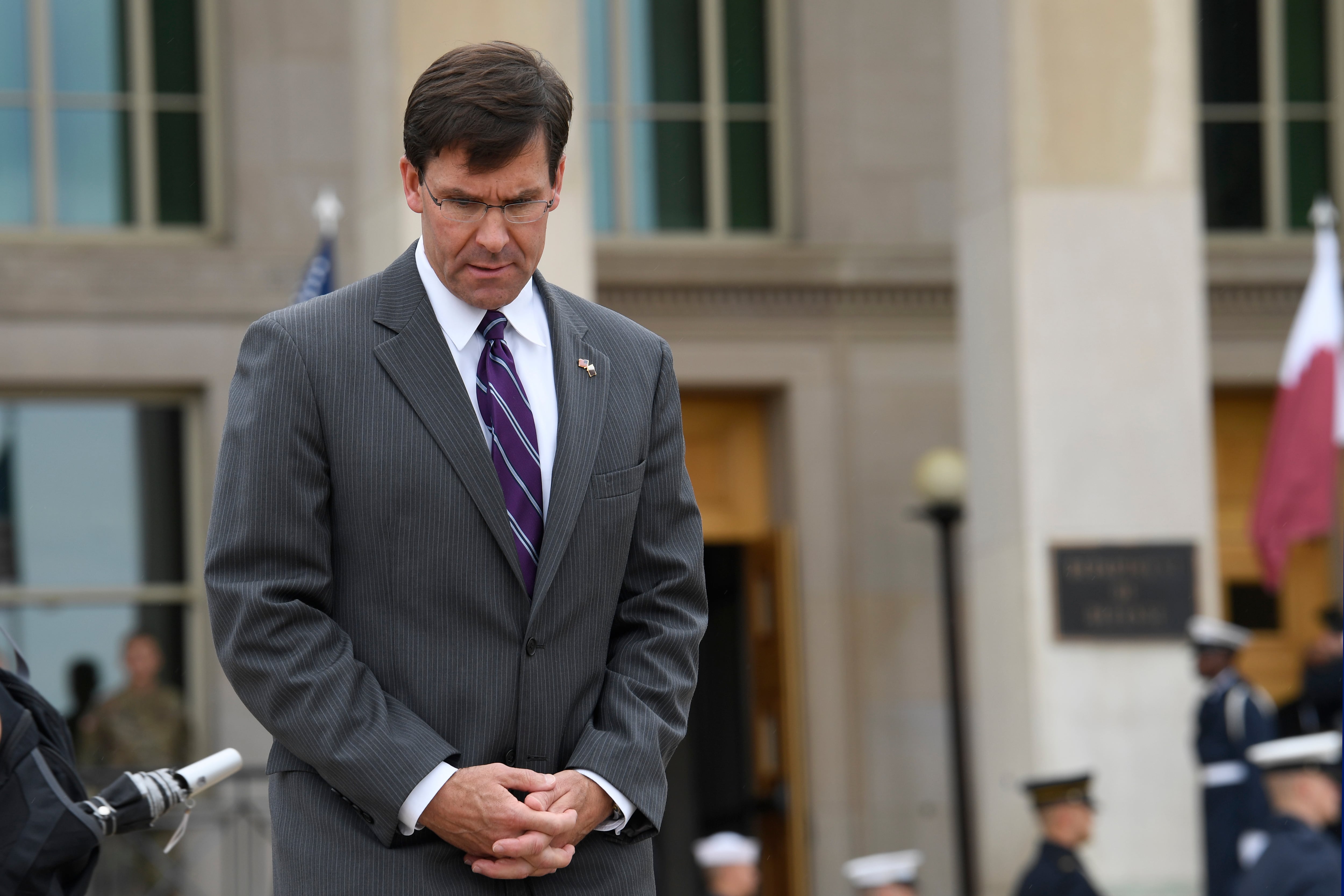WASHINGTON — The Senate on Tuesday overwhelmingly approved Mark Esper to be the country’s 27th defense secretary, ending a wait of more than 200 days for a permanent Pentagon leader.
Esper’s relatively drama-free confirmation vote — 90-8 — stood in contrast to the seven months of uncertainty in the highest levels of the military’s leadership.
After former Defense Secretary Jim Mattis was forced out of his post early on the first day of 2019, acting Defense Secretary Patrick Shanahan helmed the department until he suddenly withdrew from consideration for the full-time job in June amid reports of domestic violence among his family members.
RELATED

Esper, who until then had served as Army secretary for since late 2017, bounced between that job and the acting defense secretary job over the last five weeks. Lawmakers and military officials expressed concerns over the temporary, unclear leadership in recent months, especially as other top military posts were vacated.
Tuesday’s vote ends the longest period the Defense Department has gone without a permanent, confirmed leader since it became a Cabinet-level agency.
Senate Majority Leader Mitch McConnell, R-Ky., said ahead of the vote Tuesday that Esper is “beyond qualified” for the top military job.
"His record of public service is beyond impressive,” McConnell said. “His commitment to serving our service members is beyond obvious. And the need for a Senate-confirmed secretary of defense is beyond urgent.”
Senate Armed Services Committee Chairman Jim Inhofe, R-Okla., offered similar praise.
“It’s not very often we have someone that is enthusiastically supported by Republicans, by Democrats, and he is obviously the right person,” he said. “He has the trust of our president, the trust of our military, the trust of Congress and the country to keep our nation safe.”
The only sharp opposition to Esper’s nomination came from Massachusetts Democratic Sen. Elizabeth Warren, a Senate Armed Services Committee member and 2020 presidential hopeful, who grilled Esper over his ties to his former employer, Raytheon.
RELATED

But since President Donald Trump announced Esper’s nomination last month, Democrats and Republicans have mostly offered effusive praise for Esper as the right candidate for the job.
At Esper’s confirmation hearing last week, Sen. Tim Kaine, D-Va., lauded Esper for hosting him and Sen. Mark Warner, D-Va., for an unvarnished look at problematic Army housing in Virginia.
“That willingness to show personal accountability was very, very impressive,” Kaine said. “He’s been proactive and he’s been transparent. ... And I think those are trademarks of exceptional leadership.”
Work ahead
Esper, a West Point graduate and former Army lieutenant colonel, was vice president of government relations for Raytheon — the third-largest defense contractor in the United States — for seven years before becoming Army secretary. His most notable work leading the Army included a shake-up of the service’s acquisitions portfolio.
He inherits a military charged with following the National Defense Strategy’s focus on competition with Russia and China but still grappling with Iran tensions, politically charged troop deployments on America’s southern border and pressure from Trump to exit Afghanistan.
The American Enterprise Institute’s Rick Berger said the leadership vacuum after Mattis has left the Pentagon “adrift.” Esper would be wise to reset relationships with Capitol Hill and the press, who have both grumbled at a lack of engagement, he added.
“The department has never been more timid about telling its story to the public or to Capitol Hill, a legacy of Secretary Mattis and his caretaker successor,” Berger said.
RELATED

Loren DeJong Schulman, a deputy director at the Center for a New American Security, said Esper’s priorities will be to fill the department’s widespread leadership vacancies, to dig into the fiscal 2021 budget process and to assert himself in decisions regarding tension with Iran.
"In doing so, he has the opportunity to reorient some troubling trends in the Pentagon, such as the growing absence of transparency with the press, Hill, and American people, and the dominance of the Joint Staff in what should be political-military policy debates," she said.
“Esper is also fighting a White House policy process driven by presidential tweet and instinct, without a responsible deliberate process. Like Mattis, Esper can insist on better cross-agency deliberation to develop policy ideas that support the president's objectives.”
Senators will move onto the next Pentagon leadership vacancy tomorrow when they hold a confirmation hearing for David Norquist to be deputy secretary of defense.
Trump has already nominated Ryan McCarthy to replace Esper as secretary of the Army.
Lawmakers are also pressing Trump to move quickly on naming candidates for other key Pentagon leadership vacancies, including a new Air Force secretary, a new Defense Department comptroller (Norquist’s current job), and a new undersecretary for personnel and readiness.
Joe Gould was the senior Pentagon reporter for Defense News, covering the intersection of national security policy, politics and the defense industry. He had previously served as Congress reporter.
Leo covers Congress, Veterans Affairs and the White House for Military Times. He has covered Washington, D.C. since 2004, focusing on military personnel and veterans policies. His work has earned numerous honors, including a 2009 Polk award, a 2010 National Headliner Award, the IAVA Leadership in Journalism award and the VFW News Media award.





